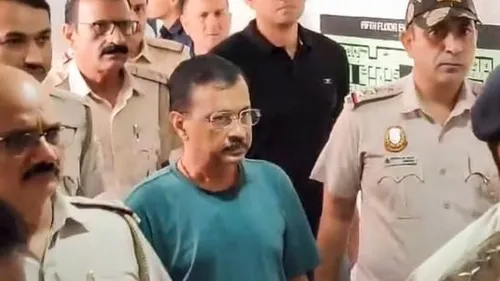Introduction: Legal Battle Unfolds
Delhi Chief Minister Arvind Kejriwal finds himself at the center of a legal storm as the Supreme Court is set to hear his bail plea today in connection with the excise case. This high-profile case has drawn significant attention due to its political implications and the involvement of a prominent public figure. The bail plea represents a critical moment in Kejriwal’s ongoing battle against the charges leveled against him, and the Supreme Court’s decision will have far-reaching consequences for both the legal case and Kejriwal’s political career.
Table of Contents
Background: The Excise Case Explained
The excise case against Kejriwal stems from allegations of irregularities and corruption in the Delhi government’s excise policy. The policy, which was implemented with the aim of generating revenue for the state, has been accused of favoring certain liquor vendors and leading to a loss of revenue. The investigation into the case has been extensive, with the involvement of various law enforcement agencies, including the Central Bureau of Investigation (CBI) and the Enforcement Directorate (ED).
Allegations and Charges: A Closer Look
The charges against Kejriwal are serious, including allegations of corruption, misuse of power, and financial irregularities. According to the prosecution, the Delhi government’s excise policy was designed to benefit a select group of liquor vendors, leading to a significant loss of revenue for the state. The case also includes accusations of bribery and kickbacks, with claims that certain officials were paid to ensure favorable treatment for specific vendors.
Kejriwal, however, has vehemently denied all allegations, asserting that the excise policy was implemented transparently and in the best interests of the public. He has maintained that the charges against him are politically motivated and part of a larger conspiracy to tarnish his reputation and hinder his political career.
Legal Proceedings: A Timeline
The legal proceedings in the excise case have been ongoing for several months. Kejriwal was initially summoned for questioning by the CBI, after which he was granted interim bail. The case has since moved through various stages, with the Delhi High Court rejecting Kejriwal’s plea for quashing the FIR against him. The Supreme Court’s hearing today represents the latest development in this complex legal battle.
The legal arguments in the case have been intense, with both the prosecution and defense presenting their perspectives. The prosecution has argued that the evidence against Kejriwal is strong and that he should be held accountable for his actions. The defense, on the other hand, has argued that the charges are baseless and that Kejriwal’s actions were within the bounds of the law.
The Bail Plea: What’s at Stake?
The bail plea before the Supreme Court is a critical juncture in the case. If granted, Kejriwal would be able to continue his duties as Chief Minister without the immediate threat of arrest. However, if denied, he could face significant legal challenges, including the possibility of imprisonment. The outcome of the bail plea will also have broader political implications, potentially impacting Kejriwal’s standing within his party and his future in politics.
The legal team representing Kejriwal is expected to argue that the charges against him are unfounded and that he poses no flight risk. They are also likely to highlight Kejriwal’s cooperation with the investigation and his commitment to upholding the law. The prosecution, however, is expected to argue that the charges are serious enough to warrant continued legal scrutiny and that granting bail could undermine the investigation.
Political Ramifications: A Broader Impact
The excise case and the bail plea have significant political ramifications. Kejriwal’s role as Chief Minister and his leadership of the Aam Aadmi Party (AAP) are under scrutiny, and the case has become a focal point of political debate in Delhi and beyond. If the Supreme Court denies bail, it could lead to a major political crisis in Delhi, with potential implications for the stability of the AAP government.
The case has also sparked discussions about the role of the judiciary in political matters and the extent to which legal battles can influence political outcomes. Kejriwal’s supporters argue that the case is an example of political vendetta, while his opponents view it as a necessary step in holding public officials accountable for their actions.
Public Perception: Divided Opinions
Public opinion on the excise case is divided. Supporters of Kejriwal see the case as an attempt to weaken his political influence and discredit his achievements as Chief Minister. They argue that the charges are part of a larger strategy to undermine the AAP and prevent Kejriwal from challenging the political status quo.
The media coverage of the case has been extensive, with news outlets closely following the developments and providing a platform for both sides to present their arguments. The case has also sparked discussions on social media, with users expressing a wide range of opinions on the matter.
Conclusion: Awaiting the Verdict
As the Supreme Court prepares to hear Kejriwal’s bail plea, the outcome of the case remains uncertain. The legal arguments on both sides are strong, and the decision will have significant implications for Kejriwal, his political career, and the broader political landscape in Delhi.








